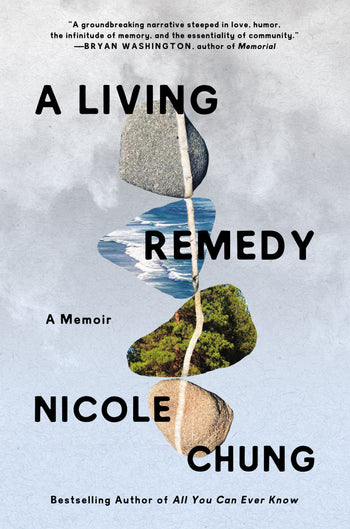A Living Remedy
Written by Nicole Chung
2023
256 pages
ISBN: 978-0063031616
“It’s like being unadopted,” Nicole Chung writes of the passing of her parents in her second memoir, A Living Remedy. For those unfamiliar with Chung’s first memoir, All You Can Ever Know, the author is an ethnic Korean adopted by Caucasian parents. While her first memoir introduces readers to her upbringing as a trans-racial adoptee in a small, predominantly white Oregonian town, this second memoir bids farewell to two of the main “characters” within Chung’s story: her parents.
A Living Remedy offers an introspective yet painful examination into Chung’s grieving process: discovering her parents’ illnesses, witnessing their suffering during treatment (often from afar due to Covid restriction), and then finally reckoning with their untimely passing, demonstrably accelerated by the indifferent, obfuscated labyrinth that is the American healthcare system. “I tried to help them research available assistance, though I knew how they felt about government programs,” Chung writes. The empathy you feel for Chung is sharp when she continues, detailing that they were denied Medicare and Medicaid because they were a combination of too young, lacking dependents, and somehow made too much or not enough money at the same time. Your blood pressure rises when you read that Chung implores her parents to keep trying to get coverage, reminding them that “nearly everyone is denied” the first time they seek benefits. Most know of a friend or family member who had fallen through the cracks due to government bureaucracy which makes this situation all the more relatable. The reader feels intimately connected to Chung’s story because of her ability to paint her “characters” vividly.
Chung’s portrayal of her grief and despair, which sometimes leaves her incapacitated, is relatable in several aspects. You get a sympathetic window into the personal tragedy that she, as an adopted, only child experiences, like when she states she feels like she’s been “unadopted,” or moments of suicidal ideation. Then you also get an empathetic mirror of parallel heartache that makes you feel what she feels, like when she takes comfort in her new dog, Peggy. Speaking of Peggy, she writes “I think she immediately recognized that I was broken and needed her,” which is undoubtedly something most “pet parents” have thought during times of grief.
The death of our parents is inescapable and if someone needs a catalyst for a cathartic release, this story could help. More broadly, this unifying rite of passage coupled with Chung’s disarming, vulnerable, and personable writing style makes the book difficult to put down.
Review by Nicole Arnold, editing assistance by Molly Higgins.
Book reviews and author interviews featured on APALAweb.org are reflective of the reviewer and interviewer only and are conducted separately from and independently of APALA and the APALA Literature Awards Committee and juries.

